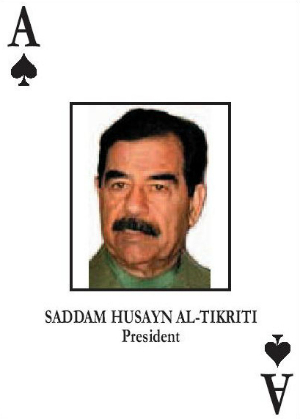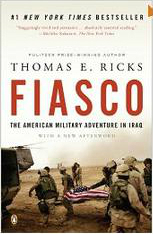Thomas E. Ricks's Blog, page 95
August 2, 2013
Ike and Obama: Is crisis avoidance the dominant foreign policy trait of both?

During the summer, the Best Defense is in
re-runs. Here are some favorites that ran in late 2012 and in 2013. This item originally
ran on Feb. 18, 2013.
I was in a
discussion the other day of the Obama administration's foreign policy. The more
I listened, the more President Obama began to remind me of President
Eisenhower.
There is indeed a
long list of foreign crises pending right now:
getting out of
Afghanistan
Syria
Iran/nukes
Af/Pak
Pakistan vs.
India
China vs. Japan
slow collapse
of North Korea
global warming
European
economic situation
advent of
cyber-warfare
But as I listened
to the discussion, I thought of President Eisenhower, who took office and set
to getting us out of the Korean War, as Obama did with Iraq. He also worked
hard to keep us out of the French war in Vietnam, overriding the Joint Chiefs'
desire to use nukes to help the French. He also rejected pleas of many to
intervene in the Hungarian Revolution. And he had the Suez Crisis, with the
French and British. Then there were issues of Stalin's successors in the Soviet
Union, which was rapidly building its nuclear arsenal.
I suspect that
Obama's dominant impulse is to keep us out of the problems he sees overseas,
just as Ike sought to keep us out of Vietnam and Hungary. Many people disagreed
with his decisions. But he was a successful president.
August 1, 2013
The many ways in which the French gov't is dead wrong to pay ransom for hostages

During the summer, the Best Defense is in
re-runs. Here are some favorites that ran in late 2012 and in 2013. This item originally
ran on Feb. 11, 2013.
Vicki
Huddleston, a former U.S. ambassador to Mali, says that the French government paid
$17 million to ransom French nationals in recent years. She further alleges
that these payments funded al Qaeda-linked operations in Africa.
The
French are wrong to do this. Not just mildly wrong, but massively wrong. Not
only are they funding terrorism, they are increasing the chances that their
people will be nabbed.
I say
this as someone who feared getting kidnapped in Baghdad. This was at a time
when Iraqi criminals supposedly were nabbing people and then selling them to al
Qaeda. I was once in a group of reporters summoned to the Green Zone for a
briefing from an American security official. He informed us that Baghdad was
the most dangerous city in the world, that we were the most lucrative targets
in the city, and that he thought we were nuts. Thanks fella!
Bottom
line: I felt that my best defense was the U.S. government policy of not paying
kidnappers. I still do.
July 31, 2013
Comment of the day: A father discusses the marker for his son in the backyard

During the summer, the Best Defense is in
re-runs. Here are some favorites that ran in late 2012 and in 2013. This item originally
ran on Feb. 8, 2013.
From "Gold Star Father":
The government marker (VA supplied) is (illegally) in my
backyard bolted to a flat stone that I found and it lies under a Weeping Willow
that friends of my wife gave to her. I make it a point to look at it nearly
daily, christen it with splatterings of whatever cocktail I may have in hand,
and have a conversation with my son. The marker is mine, its for me. My son's
ashes were returned to the sea. The marker is my place to go. It's illegal that
I have it, but I know/knew ways to make it happen to be in my possession. I
defy the VA cemetery police to come and get it. There will be blood if they
show up in my driveway.
July 30, 2013
Do we dishonor the dead with 'Operation Iraqi Freedom' on their tombstones?

During the summer, the Best Defense is in
re-runs. Here are some favorites that ran in late 2012 and in 2013. This item originally
ran on Feb. 7, 2013.
By Charles Krohn
Best Defense department of second
thoughts
Is it an honor or a cruel joke to read "Operation Iraqi
Freedom" on the headstone of a fallen soldier?
Given the irony of OIF in a historic
context, the question is
not irreverent, but it is relevant. This wouldn't be true, of course, if our
invasion had yielded results intended and predicted, however imperfectly.
As an old soldier who has carried
one too many body bags out of the battlefield, I feel a great kinship with the
next of kin of the fallen. Few memories hold greater pain.
I wouldn't even ask this
question if I didn't wonder if some in the Gold Star community weren't also
asking it, even to themselves. And if any read this, please accept my reverence
for you and the deceased. I know your loved one answered
the call of the nation, understanding great risk was necessary to protect
our country and help spread freedom among the oppressed. What could
be more noble?
Is it not just as honorable now to
recognize the prospect of freedom in Iraq as originally postulated is remote?
As others have written, there is still great confusion about who will lead
Iraq. The only thing most agree upon is that Iran, once held in check by Iraq,
is now spreading its virulent reach deeper into the region, with a nuclear
threat just around the corner.
Simply stated, the inspiration for
Operation Iraqi Freedom was a dream. Does it honor or dishonor those who fell
to perpetuate this myth on their headstones?
Should the matter be swept under the rug as an incidental
slip of history or should next-of-kin have the option of a new headstone,
marking sacrifice without promoting an idea whose time has passed?
Charles A. Krohn
is the author of
The Lost Battalion of Tet
. Now chilling in Panama City Beach, Florida,
he
served in Iraq in 2003-2004 as public affairs adviser to the
director of the Infrastructure Reconstruction Program, and later as public
affairs officer for the American Battle Monuments Commission.
July 29, 2013
Ten questions about the future of counterinsurgency and stabilization ops (I)

During the summer, the Best Defense is in
re-runs. Here are some favorites that ran in late 2012 and in 2013. This item originally
ran on Feb. 6, 2013.
By Major Tom Mcilwaine,
Queen's Royal Hussars
Best Defense guest columnist
There
appears to be a growing sense that the era of COIN that began on 9/11 is
drawing to a close. The chief prophets of the philosophy are, for various
reasons ranging from the personal to the professional, no longer quite the
force they once were, or are not needed quite as urgently by politicians who
have accepted the drawdown from Afghanistan as the end of the era of nation-building
through COIN. Nations are growing tired of seemingly endless wars that rumble
on, without a positive conclusion. There is a belief that we, the West, cannot
afford to fight these campaigns anymore, not in an age of austerity and fiscal
cliffs, which seems to be the one thing on which economic commenters and
treasury secretaries across the political spectrum and across the West can
agree. Perhaps more interestingly there is also a growing belief that we can
opt out of fighting such wars in the future. The trend in staff colleges around
the world is to return to the proper business of
soldiering
-- major combat operations. This trend is bolstered by a belief that our skills
in this area have atrophied over the last decade or so of constant patrolling
in the deserts, towns, and mountains of obscure foreign countries of which we
never really knew much about, or cared much for.
Notwithstanding
the wishes of senior commanders, who make much of the fact that the we in
Western militaries must not simply press the reset button and dump our
experiences of the last decade, it seems probable that the need to train for "old
school" major combat operations will probably lead to this happening in
practice -- because people train to be good at what they are going to be
assessed on, which in the near future is going to be old fashioned warfighting,
however it is currently described. And at the moment we lack experience in this
area. A personal example illustrates this. I will take command of a cavalry
squadron in September; I have not been employed on tanks since 2005 and the sum
total of my armored experience amounts to a little less than two months. If you
were my regimental commander, in a post-Afghan conflict world, would you be
more worried about training me to do my core skills -- armored warfare -- or
ensuring I retained more esoteric knowledge that is no longer in vogue -- COIN?
As
this belief grows stronger (and it will -- especially after 2014) there will be
a tendency to put away the lessons of the period of 2001-2014, in a part of our
brain that we do not choose to look at very often. And then, when in years to
come we find ourselves fighting another similar campaign in another part of the
world that we also know little of and care even less for, we will find
ourselves having to go through the same painful process of learning and
adaption that we have experienced over the last decade. At the risk of naming
the elephant in the room, we run the risk of repeating the mistakes of the
post-Vietnam era.
There
is an even more frightening prospect than this, however. What if we don't
actually learn the correct lessons at all from our experiences? What if, in the
hurry to put away the experiences of the last decade, we find ourselves failing
correctly to identify what it is we have been doing, and so when the time comes
to bring forth the knowledge so painfully earned, we bring forth the wrong
solution? Put bluntly -- will we actually learn any lessons at all, let alone
the correct ones, or will we simply repeat the platitudes of today in the
future, while ignoring the hard facts? If we avoid the Vietnam syndrome, will
we fall victim to the Northern Ireland syndrome?
This
is an urgent point that needs to be addressed. Now. Not when we next find
ourselves doing COIN. To try and ensure that this is not the case I have drawn
up a list of 10 questions which I believe it might prove profitable to answer,
or at least discuss. I have no particular answers in mind for them, because I
myself was a distinctly average COIN practitioner, full of zeal but lacking
tact and understanding. With these limitations in mind I present my questions
for better minds than mine to answer.
Question One -- Have we really been fighting counterinsurgency
campaigns at all? The simple answer to this question is, "Yes. That is what the
manual is called, idiot." But before the idea that we haven't been fighting
counterinsurgency campaigns at all is dismissed out of hand, consider the
following supplemental questions. Is it possible to fight expeditionary COIN? Can
you fight a COIN campaign when you first have to remove the legitimate
government of another country? Can you fight a COIN campaign when you are seeking
to radically alter the fundamental nature of a society? Or, taken together, do
these factors make you a better fit for the role of the insurgent (albeit one
so well-equipped with iPads and bottled water that we could pass for the Occupy
Movement) than counterinsurgent? This links back to the fundamental question
asked by Clausewitz -- what sort of war are you fighting? It is critical to
acknowledge that we are not likely to deploy deliberately to fight a COIN war; we
deploy to do something else -- e.g. foreign internal defense or regime change
-- and then our stabilization operation goes wrong and we are forced to fight a
COIN war. Being able to recognize this (the nature of the war we are fighting)
is the first step in being able to adapt and win.
Major Tom
Mcilwaine is a British Army officer who is currently a student at the
School of
Advanced Military Studies at Ft. Leavenworth. He has deployed to Iraq as
a platoon commander and battalion operations and intelligence officer,
to Bosnia
as aide to the commander of European forces and to Afghanistan as a
plans officer with I MEF (Fwd). The views here are his own and do not
necessarily
reflect those of the School of Advanced Military Studies, the U.S. Army,
the
U.S. Department of Defense, nor perhaps even those of
the
Sussex
County Cricket Club
.
July 26, 2013
Question of the day: Was removing Saddam Hussein in fact a good thing?

During the summer, the Best Defense is in
re-runs. Here are some favorites that ran in late 2012 and in 2013. This item originally
ran on Feb. 5, 2013.
Recently I was at a foreign policy discussion in which a
participant said that everybody agrees that the removal of Saddam Hussein was a
good thing, despite everything else that went wrong with the boneheaded
invasion of Iraq.
I didn't question that assertion at the time, but found
myself mulling it. Recently I had a chance to have a beer
with Toby Dodge, one of the best strategic thinkers
about Iraq. He said something like this: Well, you used to have an oppressive
dictator who at least was a bulwark against Iranian power expanding westward.
Now you have an increasingly authoritarian and abusive leader of Iraq who
appears to be enabling Iranian arms transfers to Syria.
And remember: We still don't know how this ends yet. Hence
rumors in the Middle East along the lines that all along we planned to create a
"Sunnistan" out of western Iraq, Syria, and Jordan.
Meanwhile, the Iraq war, which we left just over a year ago,
continues. Someone bombed police headquarters in Kirkuk over the weekend, killing 33. And
about 60 Awakening fighters getting their paychecks were blown up in Taji. As my friend Anthony Shadid used to
say, "The mud is getting wetter."
July 25, 2013
McMaster, Korb, and Iraq: Here is what Tom Ricks missed about my NYT letter

By Lawrence Korb
Best Defense guest
respondent
Like
Tom, I have written many things about Iraq, including outlining the strategic
redeployment (with my colleague Brian Katulis) which became the basis for President
Obama's plan to end our involvement in that mindless, needless, senseless
war. But for reasons of space (letters are limited to 200 words), I could
not include all these points in my letter to the New York Times.
I
do agree with Tom that the military also made huge mistakes in Iraq and needs
to address the two major problems that Tom correctly claims it had in
Iraq. But these problems also were not completely of their own
making. As I have written over and over, the all-volunteer force was
never intended to fight protracted, large-scale wars, and its reserve component
was never intended to be an operational (as opposed to a strategic)
reserve. When the Bush administration decided to invade Iraq while the
nation was still engaged in Afghanistan, it should have activated the selective
service system. Had selective service been activated, the military would
not have had to lower its recruiting standards so drastically (between 2003 and
2007, the ground forces gave 100,000 moral waivers to meet its recruiting goals),
invoke stop loss, soften the criteria for promotion, shorten the time troops
were given between deployments (the standard my office employed when I was in
government was two years at home for every year in a war zone), and hire so
many private contractors with dubious backgrounds who were so difficult to
control.
Also,
I would argue that Tom misses two other big failings of the military.
First,
by publicly supporting the Bush administration's failing strategy, the military
ignored the evidence and extended the conflict. See, for example, then-Lieutenant
General David Petraeus's op-ed in the Washington
Post shortly before the
2004 presidential election,
which painted a bright picture of the situation on the ground in Iraq.
Second,
the military remained silent as manpower and resources were diverted to Iraq
from Afghanistan before the job was finished. Had we not done that, we
would not still be bogged down in that graveyard of empires, and our military leaders were remiss
not to object to such poor strategic decision-making.
Lawrence J.
Korb
is a senior fellow at the
Center for American
Progress
. He is also a senior advisor to the
Center for Defense Information and an adjunct professor at Georgetown
University. Prior to joining American Progress, he was a senior fellow and
director of national security studies at the Council on Foreign Relations.
Lawrence Korb's unhelpful letter today to the editor of the New York Times

Today's
New York Times carries this letter from
Lawrence Korb, who in the early 1980s was an assistant secretary of defense for
manpower, reserve affairs, installations and logistics:
I disagree with Gen. H. R.
McMaster ("The Pipe Dream of Easy War," Sunday Review, July
21) when he attributes our failures in Iraq and Afghanistan to an overreliance
on new technology, which clouded our understanding of the conflicts.
The problems in both wars
were created primarily because President George W. Bush and his advisers
ignored the advice of the Army chief of staff about how many troops to send
into Iraq and the on-the-ground commanders' warnings about disbanding the Iraqi
Army and civil service. Similarly, in Afghanistan they snatched defeat from the
jaws of victory in 2003 by ignoring our military commanders and diverting
manpower and resources to the unnecessary war in Iraq.
This
is the problem I have with Dr. Korb's letter: I worry that it helps enable the
U.S military to go on blaming the civilians for everything that went wrong in
Iraq. Yes, I know the Bush administration made huge mistakes -- like invading
Iraq in the first place, not having a plan for what to do once it got there,
and operating on bizarre assumptions rather than a realistic assessment of the
way forward. In fact, I wrote a book about
all that.
That
said, the U.S. military made huge mistakes as well, but has not had to confront
them nearly as much. The fact of the matter is that our military was badly
unprepared for the tasks facing it in Iraq, especially at the general officer
level. Had the Bush administration listened to General Shinseki and sent twice
as many troops, we likely would have had our poorly commanded troops simply
pissing off twice as many Iraqis. Good strategy will fix bad tactics, but good
tactics will not fix bad strategy, or take the place of no strategy.
Why
do I think the U.S. military has failed to heed the lessons of Iraq? Because I
think that, among other things, it has never addressed two major problems it
had there. The first is torture, the second is the effect of troop rotations on
the conduct of the war. (For example, why did some units torture, and others
didn't? And what was the effect of rotating all but the four stars out every
year?) Korb's letter, and similar expressions, simply make it easier for the
military to go on whistling past the graveyard.
July 24, 2013
How a rogue pilot misbehaved for years in a B-52 squadron, and so killed 4 people

During the summer, the Best Defense is in
re-runs. Here are some favorites that ran in late 2012 and in 2013. This item originally
ran on Feb. 1, 2013.
Of all
the military services, the one I know least about is the Air Force, which
doesn't get a lot of electrons on this blog. So I was especially intrigued to
finally sit down and go through a study sent to me months ago by a Best Defense
reader. "Darker Shades of Blue: A Case Study of
Failed Leadership"
is a thorough, careful study of how leadership lapses over the course of
several years ultimately led to disaster in an Air Force bomber wing. It's also
a beautiful if horrifying exploration of how bad shit can happen despite
volumes of rules and regulations aimed at ensuring safe practices are followed.
Even if
you care nothing about the Air Force, it is a fascinating study of leadership,
and applicable to many different situations. Basically, it is the tale of how
an out-of-control pilot managed to consistently break the rules, but did so
with a clever understanding of how to manipulate the system. So, for example,
he would push the limits until his commander sat him down and gave him an oral
warning. But these were not recorded. So the pilot, who had a reputation as
perhaps the best B-52 pilot in the Air Force, would lay low a bit and then,
when the next commander came in, the pattern would repeat itself. The rogue
pilot got by on a series of these "last chance" reprimands. Subordinates knew
what was going on, and found themselves in the position of either risking their
lives by flying with him, or risking their careers by refusing to do so.
When a
senior officer was told about video evidence showing a recent instance of
flight indiscipline by the free-styling pilot, he responded, "Okay, I don't
want to know anything about that."
Eventually,
on June 24, 1994, a B-52 with the rogue pilot at the controls went down at Fairchild
Air Force Base while attempting a tight 360 degree left turn around the control
tower at 250 feet above the ground. It "banked past 90 degrees, stalled,
clipped a power line with the left wing and crashed," killing four crew members
-- three lieutenant colonels and a colonel.
The key
thing to watch, warns the author, Tony Kern, is "incongruity between senior
leadership words and actions." That is a very important lesson for any
organization.
(A big tip of the official BD baseball
cap to the person who sent me the link a couple of months ago -- I searched all
four of my e-mail accounts and couldn't find who it was, but I appreciate it.)
July 23, 2013
Is there a natural rate of relief of about 9 percent for commanders in combat?

During the summer, the Best Defense is in
re-runs. Here are some favorites that ran in late 2012 and in 2013. This item originally
ran on Jan. 29, 2013.
That's the question
that occurred to me as I read Douglas Allen's fine essay on how the Royal
Navy managed its skippers -- and provided incentives for aggressive approaches
-- during the age of fighting sail. I was struck by his passing observation
that in the mid-18th century, 8.5 percent of its captains were
dismissed or court-martialed.
That's not far from
the rate of relief of 16 out of 155 U.S. Army generals who commanded divisions
in combat in World War II -- the point of departure in my latest book. So I wondered: In organizations determined to enforce standards and
insist on aggressive competence, is there a natural rate of relief of roughly 9
or 10 percent? Business is not the same as military operations, but I also
remember that three decades ago, when I was a Wall Street Journal reporter based in Florida, one of the better
banks in the state, Barnett, had an annual branch manager relief rate of 10
percent. A couple of people also have reminded me that GE, under Jack Lynch,
had a policy of easing out the bottom 10 percent of its managers every year.
But the piece on the
Royal Navy is much more far-ranging. It essentially is a study of how the Navy
leadership of the 18th century addressed the important question of how
to run a large organization with global reach but iffy communications. (The
person who sent it to me was thinking about how one might organize command and
control of a future U.S. space fleet.) It was also a successful organization,
in which, despite being "constantly outnumbered in terms of ships or guns,...still
managed to win most of the time." Professor Allen outlines what he calls "the
critical rules of the captains and admirals" that ensured that commanders would
operate more or less in the interest of the nation rather than in their own.
"The entire governance structure encouraged British captains to fight rather
than run" -- and so also to have crews trained to fight.
Prize money was
especially important. Some senior officers grew rich off the capture of enemy
ships. "At a time when an admiral of the fleet might earn 3,000 pounds a year,
some admirals amassed 300,000 pounds of prize money." The awards also trickled
down: In 1799, when three frigates captured two Spanish ships, each seaman in
the three crews received 182 pounds -- the equivalent of 13 years of annual
pay.
Thomas E. Ricks's Blog
- Thomas E. Ricks's profile
- 436 followers



